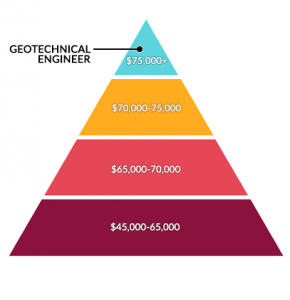The Definitive Guide to Geotheta
The Definitive Guide to Geotheta
Blog Article
The Geotheta Statements
Table of ContentsThings about GeothetaSome Known Details About Geotheta Not known Factual Statements About Geotheta The Best Strategy To Use For GeothetaExcitement About Geotheta

They perform website examinations, accumulate examples, execute laboratory examinations, and analyze data to evaluate the suitability of the ground for building projects - Consulting Engineer. Based upon their findings, geotechnical engineers offer referrals for foundation layout, incline security, preserving frameworks, and mitigation of geotechnical dangers. They work together with various other experts, such as architects, architectural engineers, and building and construction groups, to make sure that geotechnical factors to consider are incorporated right into the general task design and implementation
By evaluating the actions and residential or commercial properties of soil and rock, they can determine possible geotechnical risks such as landslides, dirt negotiation, or incline instability. Their expertise aids protect against failings or mishaps that might threaten lives and residential property. Here are some detailed responsibilities and responsibilities of a geotechnical engineer: Site Examination: Geotechnical designers conduct website investigations to collect data on subsurface conditions.
They translate the data to comprehend the residential properties and behavior of the dirt and rock, including their stamina, leaks in the structure, compaction qualities, and groundwater problems. Geotechnical Analysis and Layout: Geotechnical designers analyze the data collected throughout site examinations to analyze the security and viability of the website for building and construction tasks. They execute geotechnical calculations and modeling to assess variables such as birthing ability, settlement, slope security, side planet stress, and groundwater flow.
All about Geotheta
Foundation Design: Geotechnical engineers play a critical role in designing foundations that can securely sustain the intended framework. They assess the dirt conditions and tons demands to establish the appropriate structure type, such as superficial foundations (e.g., grounds), deep structures (e.g (https://www.evernote.com/shard/s342/sh/0ddde0a2-417b-669e-3d11-8f53bf2073ba/dxCfPcosgpFcDl9WAXonEVeNbxWt1i_y0aMcgTcK_KXcXyxfIS3apQYAgA)., stacks), or specialized strategies like dirt improvement. They take into consideration variables such as negotiation limitations, bearing capability, and soil-structure communication to establish ideal foundation layouts
They examine building plans, screen website tasks, and conduct area evaluations to confirm that the style referrals are followed. If unanticipated geotechnical concerns emerge, they examine the circumstance and offer recommendations for remediation or changes to the layout. Threat Assessment and Reduction: Geotechnical engineers assess geotechnical hazards and dangers related to the job site, such as landslides, liquefaction, or dirt erosion.

Collaboration and Interaction: Geotechnical designers work very closely with various other specialists associated with a job, such as engineers, architectural designers, and building groups. Effective communication and partnership are necessary to incorporate geotechnical factors to consider into the overall project layout and building and construction process. Geotechnical engineers offer technological expertise, response questions, and make sure that geotechnical needs are met.
How Geotheta can Save You Time, Stress, and Money.
Here are some kinds of geotechnical designers: Structure Engineer: Structure designers concentrate on developing and assessing structures for structures. They evaluate the dirt conditions, lots requirements, and site characteristics to identify the most suitable foundation kind and style, such as superficial foundations, deep foundations, or specialized methods like heap structures.
They assess the variables affecting slope security, such as dirt buildings, groundwater conditions, and slope geometry, and establish strategies to prevent slope failures and alleviate risks. Quake Engineer: Quake engineers focus on evaluating and creating structures to hold up against seismic forces. They analyze the seismic risk of a site, review soil liquefaction possibility, and establish seismic style requirements to make sure the safety and security and resilience of structures during quakes.
They do field screening, accumulate examples, and evaluate the collected information to characterize the soil properties, geologic formations, and groundwater conditions at a website. Geotechnical Instrumentation Engineer: Geotechnical instrumentation designers concentrate on surveillance and determining the habits of dirt, rock, and structures. They mount and keep instrumentation systems that check factors such as dirt negotiation, groundwater degrees, incline motions, and architectural displacements to analyze performance and supply very early warnings of prospective concerns.
About Geotheta
They conduct examinations such as triaxial examinations, consolidation tests, straight shear examinations, and permeability tests to gather data for geotechnical evaluation and design. Geosynthetics Engineer: Geosynthetics designers focus on the layout and application of geosynthetic materials, such as geotextiles, geogrids, and geomembranes. They make use of these products to improve dirt stability, enhance slopes, provide water drainage services, and control erosion.
They tend to be investigative people, which implies they're intellectual, reflective, and investigative. They are curious, systematic, sensible, analytical, and rational. Some of them are likewise social, implying they're kind, charitable, participating, person, caring, useful, empathetic, skillful, and friendly - Consulting Engineers.
In the workplace atmosphere, geotechnical engineers make use of specialized software program tools to carry out calculations, create layouts, and assess information. They prepare reports, review project specifications, communicate with clients and employee, and coordinate task activities. The workplace setup provides a favorable setting for study, evaluation, and collaboration with various other experts included in the job.
Geotheta - The Facts
They regularly go to task sites to carry out website investigations, assess geotechnical problems, and collect data for evaluation. These sees include traveling to different areas, sometimes in remote or tough surfaces. Geotechnical engineers may carry out soil tasting, conduct tests, and monitor building tasks to ensure that the geotechnical elements of the job are being applied correctly.
Geotechnical designers likewise function in specialized geotechnical labs. Geotechnical research laboratory engineers function thoroughly in these environments, dealing with testing devices, running tools, and recording information.
Report this page